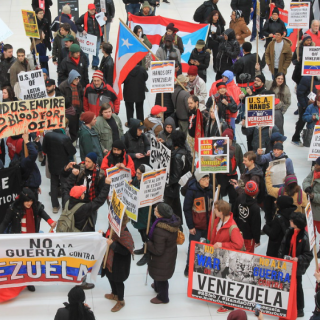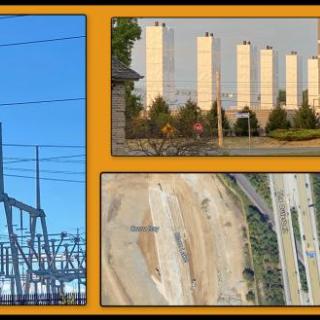Advertisement
The Hilltop Historical Society was going forward with its annual Camp Chase cemetery memorial later this week – when scores of Confederate flags are placed on gravestones – but they canceled the September 27th ceremony due to COVID concerns. This historical society told the Free Press the ongoing social justice movement had nothing to do with the cancelation.
More disconcerting and surreal to some, is what Hilltop Historical Society President Dave Dobos – who is also Vice Chair of the Franklin County Republican Central Committee – told the Free Press in regard to the canceled event.
We asked Dobos: if the event had not been canceled, would the society still have brought out scores of Confederate flags during this summer of all social justice summers?
“If it hadn’t been for the coronavirus, yes,” said Dobos, who was scheduled to speak at the canceled event. “I think anytime you are accurately portraying history, it is appropriate. Folks can make their own opinion.”
As many are aware, Camp Chase on Sullivant Avenue is a VA-owned cemetery where over 2,000 Confederate soldiers and a handful of Union soldiers are laid to rest.
True, these Confederate soldiers probably suffered terribly at the hands of Union soldiers who were holding them prisoner nearly 200 years ago at the Civil War camp which was located near this cemetery. Many died from disease and what was claimed to be one of Ohio’s coldest winters ever in 1865.
But again, that was nearly two centuries ago, and white people aligned with the Hilltop Historical Society – many who don’t even reside in the Hilltop – are still remembering (and in a way honoring, say some) the legacy of those soldiers from the South who gave up their lives so Black people would remain slaves.
Even NASCAR, the epitome of modern-day Southern culture, has banned the Confederate flag, essentially telling the South that yes, the Confederate flag and its symbolism are akin to the Nazi swastika.
The Hilltop Historical Society told the Free Press they have debated for decades whether they should continue to break out scores of Confederate flags they have in storage for this commemoration held since 1895.
But that debate has not resulted in leaving those Confederate flags in storage. What’s more, the Free Press recently visited Camp Chase and found a single Confederate flag had been placed at a gravestone and this flag can be seen from the front entrance, where just outside these gates many African Americans reside in what by all standards is a marginalized community.
Dobos says Confederate flags often show up unexpectedly because it is a public place after all. He says Confederate flags, as mandated by the VA, can only be placed on gravestones during the day of the society’s commemoration. American flags are also placed with each Confederate flag.
To be fair, Dobos served on the Columbus Board of Education from 1994 to 2000, and this summer he wrote an op-ed for the Dispatch, spelling out “A Path Forward to Addressing Racism”.
But why speak at an event where scores of Confederate flags are flapping in the wind and in attendance are descendants of Confederate veterans who are probably sympathetic to the “Cult of the Lost Cause” or “States’ Rights”?
“We are not trying to take any political stance. We are not celebrating anything. This is our history (Dobos grew up on the Westside). We are simply saying, ‘This is what happened here,’” he said. “We are not making a political statement. We are simply remembering a part of history on our end of town. There’s not a whole lot of stuff in Columbus that’s old.
“Obviously, there are things that can’t be defended. And no one is trying to assert that. What we are simply trying to do is remember a bunch of poor souls who are buried there, as well as the significance of Camp Chase for the Union during the Civil War.”
Dobos says there are two African Americans on the Hilltop Historical Society’s board. One has refused to attend the event while the other has attended through the years.
In 2017, vandals (activist heroes?) knocked down the cemetery’s Confederate soldier statue that stands on top of an arch and removed his head. The VA spent $40,000 restoring the statue’s head.
Nana Watson, president of the Columbus chapter of the NAACP, told the Dispatch at the time she was “shocked” to learn the statue was repaired and reinstalled.
“Is that a good use of our federal funds here?” Watson asked the Dispatch. “I could think of a lot of things we can request funding for in our community.”
Indeed, the Mayor’s Office and the city are pushing hard to “empower” Sullivant Avenue and its surrounding neighborhoods, which for years has been falling into economic despair, resulting in increasing rates of violence and addiction.
This summer work began on $10 million in infrastructure improvements, but the Free Press isn’t convinced better roads, sidewalks, new streetlights and traffic signals will be the cure-all.
“It is about revitalizing lives, and supporting and empowering our neighborhoods. Residents and businesses along the Sullivant Avenue corridor will be seeing exciting infrastructure improvements in progress during this construction season,” said Mayor Ginther during a related press conference.
Once again, it’s simply not enough, just like Mayor Ginther’s response against Columbus police following their actions against peaceful protesters.
A better idea for Sullivant Avenue is to fully give in to the South’s and their apologist’s need to relive the Confederate’s racist legacy that was destroyed by the Union. Repatriate their dead or re-intern their dead back to where they truly belong. Remove the dead to the South, so to remove the cemetery.
But such an undertaking would be impossible legally considering the cemetery is on the National Register of Historic Places which establishes government-wide policies about preservation.
Nonetheless, African American residents of the Hilltop can dream, can’t they?
If the cemetery were to be removed, why not build affordable housing – much needed on Sullivant Avenue – at the site?
Ohio and Columbus have a rich abolitionist and Union soldier history. Yet many of those Underground Railroad sites around Columbus are rarely celebrated as much as Camp Chase is.
Name the affordable housing “Ulysses Gardens,” or “Tecumseh Sherman Place” or “John Brown Place.”



